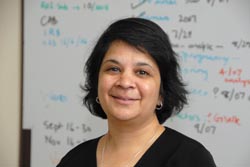|
“Our most significant finding was that the women turn to God and faith before physicians for help with family violence. We suspect that physicians might not always be aware of this, yet it’s important to understand because it may become a barrier to patients getting medical or psychological help,” said lead author Anuradha Paranjape, M.D., M.P.H., an associate professor of medicine at Temple University School of Medicine and Hospital, who added that family violence, in general, is overlooked in older individuals and overlooked in African Americans even more so.
The work is part of a $500,000 National Institutes of Health grant to study the health effects of abuse involving older African-American women and to design a screen to detect it.
“There’s a dearth of information on the experiences of older African-American women sufferers of family violence,” said Paranjape. “Most of the research has been conducted with Caucasian women and their experiences are different, which may have implications for their care.”
Unlike older Caucasian women, issues related to the length of the relationship, including worries related to their abusive partner’s ill health, did not seem to be a concern at all to older African-American women, report the researchers.
“It is possible that our participants may not have been abused by a long-term partner, or were more likely to have had experiences with abuse and neglect by family members other than partners. Family violence takes many forms that may not be obvious during a doctors’ appointment. When people think about violence they think about bruises and bedsores, but emotional abuse, financial abuse, isolation and neglect hurt too.”
Paranjape suggests that merely identifying the problem is not enough. Healthcare providers might need to also act as a resource and advocate for victims of family violence.
“Not all physicians feel comfortable discussing spirituality with their patients during the office encounter, especially if their personal view is different from their patients’ beliefs. But when they are caring for older African-American survivors of family violence, they need to be attuned to the importance of spiritual beliefs in their recovery,” she said.
|
